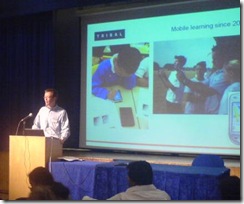Mobile learning works for lots of reasons.
- It might work for you because you can learn where you want.
- It might work for me because my phone is the only connection I have to the internet, and my classmates.
- It works for some of our excluded learners because it reaches them, and (if we are lucky), is part of their "ah-ha!" moment.
I love stories of those "ah-ha!" moments. The sudden thing that turned on a light for a learner who had stopped engaging in their learning. Several years ago we made an adult numeracy product (the numbers disc) that had an entire section dedicated to learner stories. Collecting them was a real inspiration.
Today I found a great one. It was nothing to do with "mobile", but all to do with "learning". I stumbled on it on one of the OU discussion forums asking which book changed your life.
'Decline and Fall of the Roman Empire' by Gibbon. I was 21, on state benefits, with a baby and a toddler. I kept renewing the library book in the hope that one day I might finish it.
On about the 8th renewal the librarian asked me if I had ever considered studying with the Open University. He gave me a leaflet with the contact details.
I graduated BSc Hons 2.1 nine years later.
I will always be grateful to that kind librarian. 'Decline and Fall' changed my life.
Is that inspiring, or what!
















